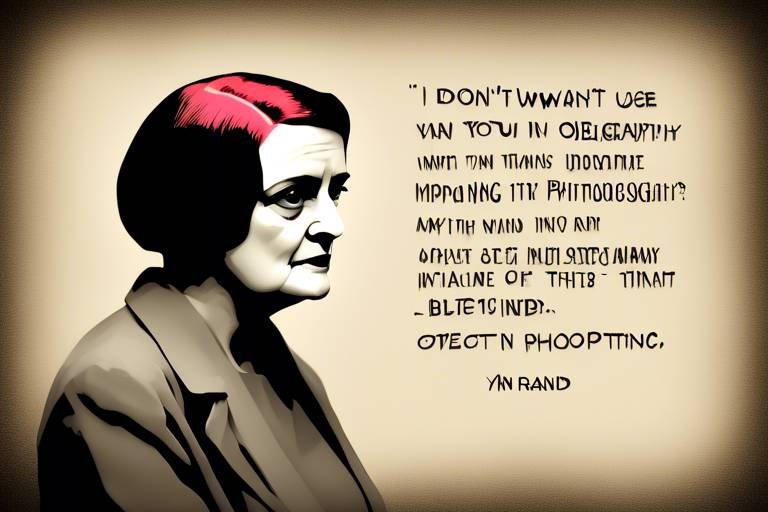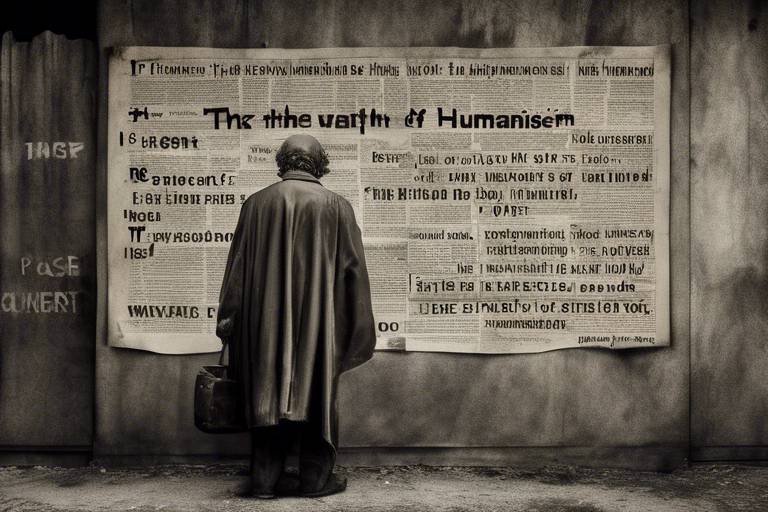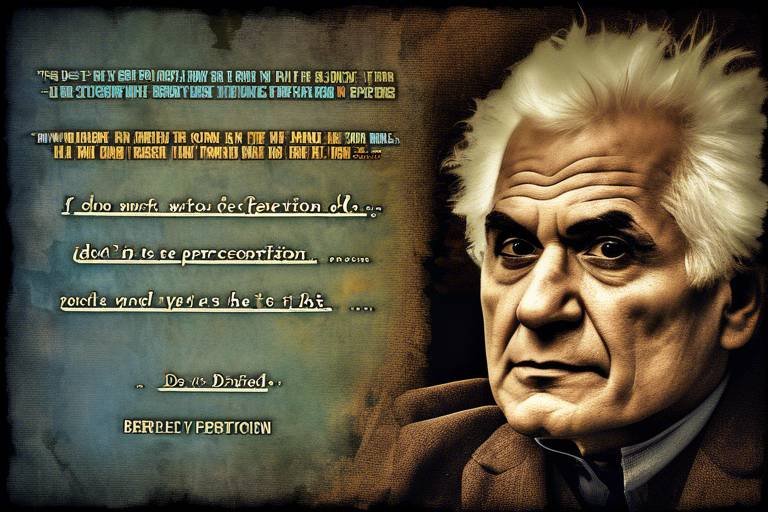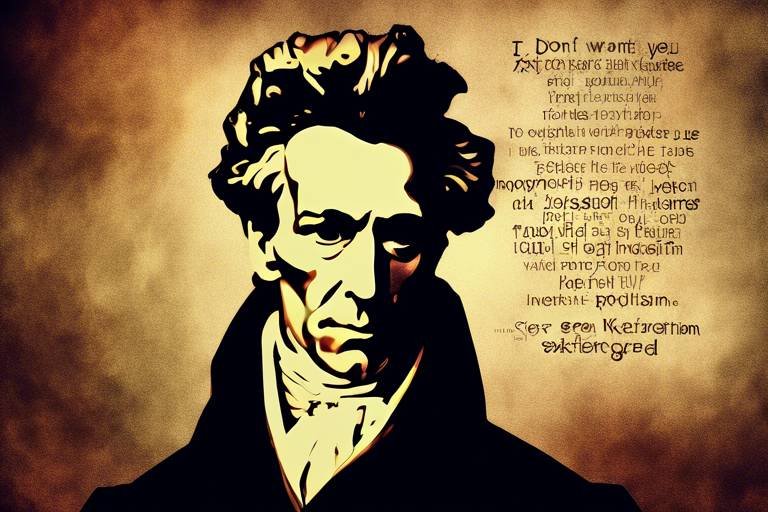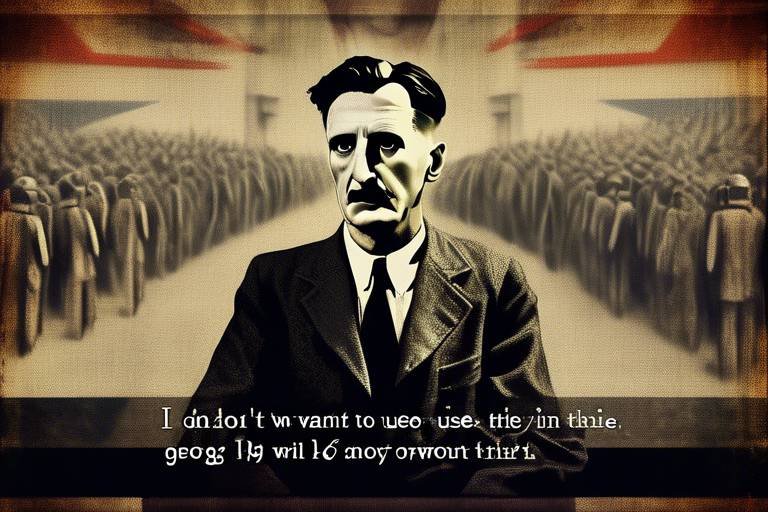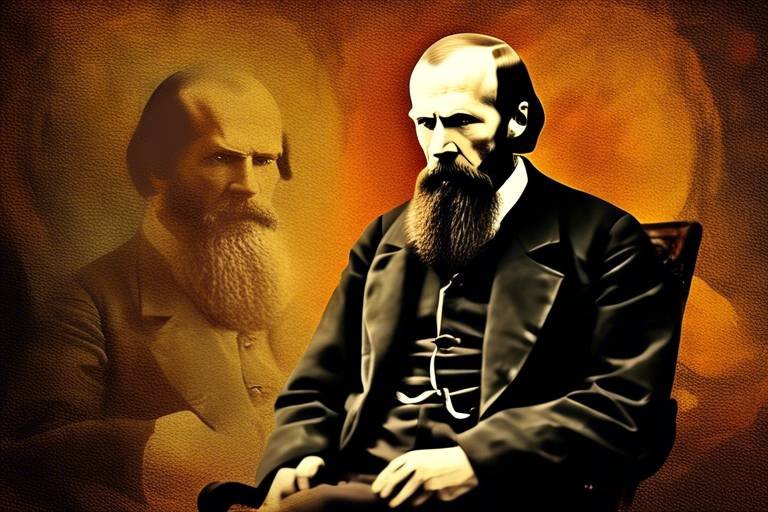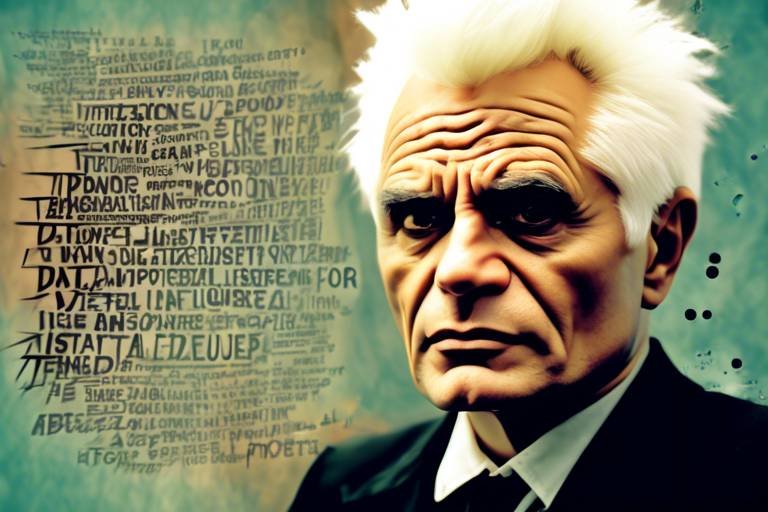An Overview of Walter Benjamin's Philosophy of History
Walter Benjamin, a German-Jewish intellectual, is often regarded as one of the most profound thinkers of the 20th century. His philosophy of history is not merely an academic pursuit; it is a deep exploration of how we perceive time, memory, and the significance of the past in shaping our present realities. Benjamin's ideas challenge conventional narratives and invite us to reconsider the linear progression of history, suggesting instead that it is a complex tapestry woven from moments of significance, trauma, and potentiality.
At the heart of Benjamin's philosophy lies the concept of historical materialism. Unlike traditional views that often highlight a straightforward march of progress, Benjamin emphasizes the intricate relationship between material conditions and historical events. His approach encourages us to view history not just as a series of dates and events but as a living entity that is constantly influenced by the socio-economic factors of its time. This perspective reshapes our understanding of history, urging us to look beyond the surface and to delve into the underlying forces that shape the course of human events.
One of the most captivating elements of Benjamin's thought is his notion of now-time (Jetztzeit). This concept signifies a moment when the past and present converge, creating a unique opportunity for revolutionary change. Imagine standing at a crossroads where the weight of history meets the immediacy of the present; this is where Benjamin believes transformative actions can occur. It’s like catching a glimpse of a fleeting moment in a photograph, where everything aligns perfectly, offering a chance to re-evaluate and reshape historical narratives. Such moments are not merely historical footnotes; they are pivotal points that can alter the trajectory of future events.
Benjamin famously illustrated his philosophy through the metaphor of the Angel of History. In this powerful imagery, the Angel is depicted as being caught in a storm, facing the past while being propelled into the future. This metaphor poignantly highlights the struggle against the relentless forces of progress that often overshadow the significance of historical events. As the Angel looks back, it sees the wreckage of history piling up, a reminder that the past is not just a collection of memories but a vital part of our identity and understanding.
Furthermore, Benjamin's work delves into the role of trauma in shaping historical consciousness. He posits that collective trauma not only informs how societies remember their pasts but also influences their current actions and future trajectories. This interplay between memory and historical narratives is crucial; our understanding of history is filtered through both personal and collective experiences. It’s like piecing together a jigsaw puzzle where each memory adds depth and context, allowing us to construct a more nuanced view of our past.
Benjamin's critique of the notion of progress is another cornerstone of his philosophy. He argues that history does not follow a linear path but is instead a complex interplay of moments that can be reinterpreted and reimagined. This perspective invites us to question the dominant narratives that often portray history as a series of inevitable advancements. Instead, Benjamin urges us to recognize the moments of crisis as opportunities for change, challenging us to rethink our relationship with the past.
Central to Benjamin's philosophy is the idea of messianic time, which suggests that history is filled with opportunities for redemption and transformation. He invites us to consider that within the chaotic flow of history, there are moments ripe for revolutionary action. This perspective is not just theoretical; it serves as a call to action, urging us to seize these moments of crisis to enact meaningful change.
Finally, the influence of Walter Benjamin's philosophy extends far beyond his own time. His ideas continue to resonate within contemporary thought, particularly in fields such as cultural studies, critical theory, and philosophy. Scholars and thinkers draw from his work to challenge prevailing narratives and to encourage new interpretations of history, proving that Benjamin's insights remain relevant as we navigate the complexities of modern existence.
In summary, Walter Benjamin's philosophy of history provides a rich and intricate framework for understanding the past, present, and future. His unique perspectives on time, memory, and the role of trauma in shaping our historical consciousness invite us to reconsider how we engage with history and its implications for our lives today.
- What is Walter Benjamin's view on historical materialism?
Benjamin emphasizes the interplay between history and material conditions, challenging traditional views of a linear progression of history.
- What does the concept of now-time signify?
Now-time represents a moment when the past and present converge, allowing for revolutionary potential and a re-evaluation of historical narratives.
- How does Benjamin's Angel of History metaphor illustrate his philosophy?
The Angel of History symbolizes the struggle against progress, depicting the importance of acknowledging the past amidst the relentless march toward the future.
- What role does trauma play in Benjamin's philosophy?
Collective trauma shapes historical consciousness, allowing societies to confront their pasts, which ultimately influences their present and future actions.
- How does Benjamin critique the notion of progress?
He argues that history is not linear but a complex interplay of moments that can be reinterpreted, urging us to recognize crises as opportunities for change.
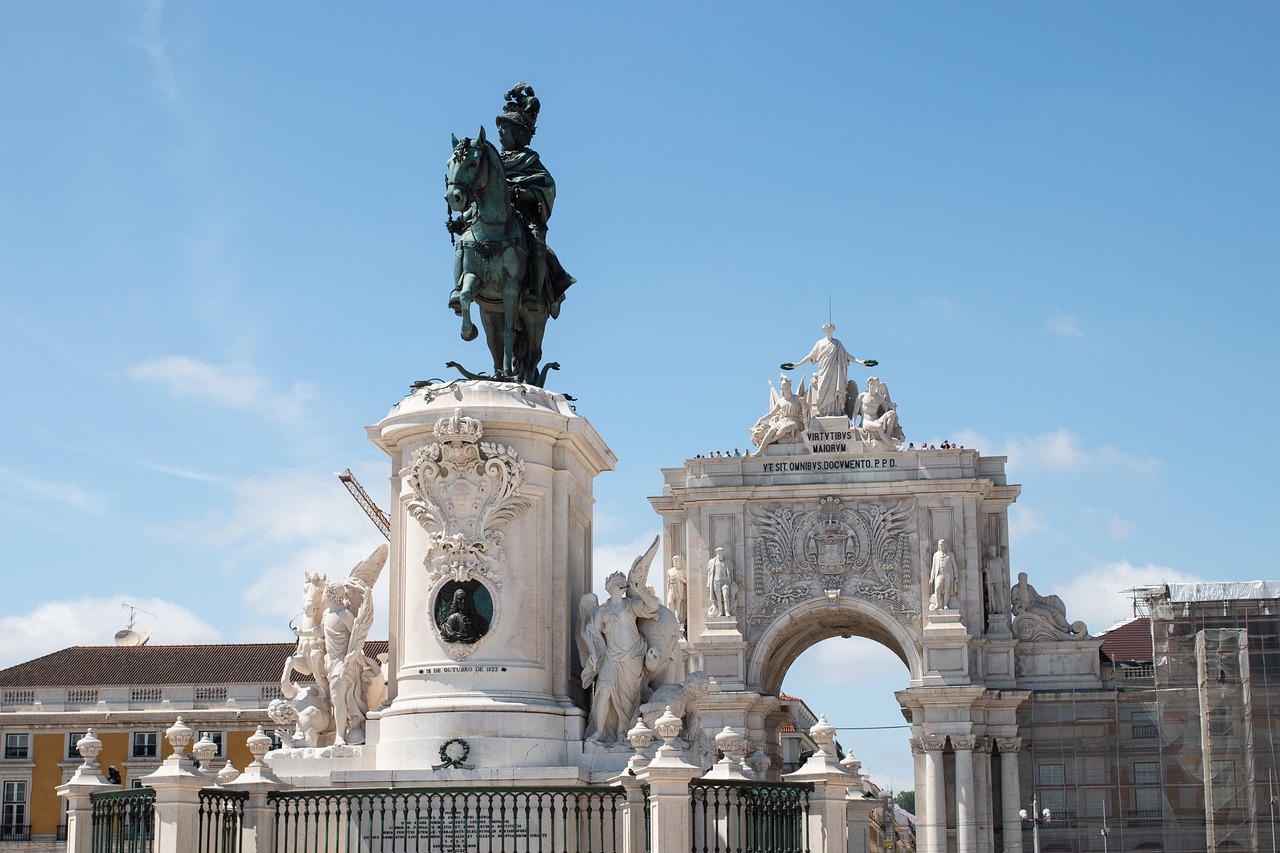
The Historical Materialism of Walter Benjamin
Walter Benjamin's approach to historical materialism is nothing short of revolutionary. Unlike the traditional views that often treat history as a linear progression of events, Benjamin emphasizes the complex interplay between material conditions and historical events. He argues that our understanding of history is deeply influenced by the socio-economic contexts in which events occur. This perspective reshapes how we interpret historical narratives, urging us to look beyond mere dates and facts to understand the forces that truly drive change.
At the core of Benjamin's philosophy is the idea that history is not just a series of events but a tapestry woven from the threads of human experience, social struggles, and material realities. He challenges us to consider how these elements interact to create a more nuanced understanding of the past. For instance, when we examine historical events like revolutions or major social movements, we must consider the economic and cultural conditions that made them possible. This approach allows us to see history as a dynamic process rather than a static record.
Benjamin's critique of traditional historical narratives is particularly striking. He argues that many historians tend to focus on the victors of history, neglecting the voices of the marginalized and oppressed. This selective memory leads to a distorted understanding of the past, one that overlooks the struggles and contributions of those who fought against prevailing powers. By emphasizing material conditions, Benjamin encourages a more inclusive approach to history that acknowledges the diverse experiences of all individuals.
To illustrate his point, consider the following table that contrasts traditional historical narratives with Benjamin's historical materialism:
| Aspect | Traditional Historical Narrative | Benjamin's Historical Materialism |
|---|---|---|
| Focus | Victors and major events | Material conditions and social struggles |
| Interpretation | Linear progression | Complex interplay of forces |
| Inclusivity | Excludes marginalized voices | Includes diverse experiences |
By recognizing the significance of material conditions, Benjamin opens the door to a more critical analysis of history. He invites us to ask questions like: What economic factors influenced this event? or How did social struggles shape the outcome? This line of questioning not only enriches our understanding but also empowers us to draw connections between the past and present, illuminating how historical injustices continue to resonate today.
In summary, Benjamin's historical materialism offers a profound shift in how we understand history. By focusing on the interplay between material conditions and historical events, he challenges traditional narratives and encourages a more inclusive and critical approach to the past. This perspective not only enhances our understanding of history but also inspires us to engage with the present in more meaningful ways.
- What is Walter Benjamin's philosophy of history?
Walter Benjamin's philosophy of history emphasizes the relationship between material conditions and historical events, advocating for a more nuanced and inclusive understanding of the past. - How does Benjamin critique traditional historical narratives?
He critiques traditional narratives for focusing on victors and major events while neglecting the voices of marginalized groups, leading to a distorted understanding of history. - What role do material conditions play in Benjamin's historical materialism?
Material conditions are central to Benjamin's thought, as they shape the social struggles and experiences that inform historical events.

The Concept of
This article explores the key concepts and ideas within Walter Benjamin's philosophy of history, emphasizing his unique perspectives on time, memory, and the role of the past in shaping the present.
Benjamin's approach to historical materialism challenges traditional views, emphasizing the interplay between history and material conditions, and how this perspective reshapes our understanding of historical events.
The notion of now-time is central to Benjamin's philosophy, signifying a moment when the past and present converge, allowing for revolutionary potential and a re-evaluation of historical narratives. Imagine a point in time where everything you've ever experienced collides with your current reality. It's like standing at the crossroads of history, where every decision made in the past influences the present and future. In this space, Benjamin argues that we can recognize the urgency of our historical moments, urging us to act rather than passively observe.
To fully grasp the significance of now-time, we must consider how it encapsulates the essence of historical consciousness. Benjamin believed that history is not merely a linear progression of events but a complex tapestry woven from the threads of individual and collective experiences. This perspective invites us to reflect on how our memories shape our understanding of history. In essence, now-time serves as a reminder that the past is not dead; it lives on in our actions and decisions.
In Benjamin's famous metaphor, the Angel of History represents the struggle against the forces of progress, depicting how the past is often overlooked in the relentless march toward the future. The angel, caught in a whirlwind of events, faces backward, witnessing the wreckage of history piling up behind it. This powerful image serves as a poignant reminder that while we may strive for progress, we must not forget the lessons of our past. It challenges us to confront the consequences of our actions and to acknowledge the voices that have been silenced along the way.
Benjamin posits that collective trauma shapes historical consciousness, allowing individuals and societies to remember and confront their pasts, ultimately influencing their present and future actions. Trauma acts as a catalyst for change, pushing us to reckon with painful memories and learn from them. It is through this confrontation that we can begin to heal and transform our understanding of history.
The interplay between memory and historical narratives is crucial in Benjamin's thought, highlighting how personal and collective memories inform our understanding of history and identity. Our memories, both individual and shared, are not static; they evolve over time, reshaping the narratives we construct about our past. This dynamic relationship between memory and history invites us to question the dominant narratives that often overlook marginalized voices.
Benjamin critiques the linear notion of progress, arguing that history is not a straightforward trajectory but a complex interplay of moments that can be reinterpreted and reimagined. He encourages us to pause and reflect on the moments that define us, rather than blindly following the path of progress. This critique serves as a call to action, urging us to engage with history in a way that acknowledges its complexities and contradictions.
Benjamin introduces the idea of messianic time, suggesting that history is filled with opportunities for redemption and transformation, challenging the deterministic views of historical development. This concept emphasizes the potential for change, reminding us that every moment holds the possibility of a new beginning.
The revolutionary potential inherent in Benjamin's philosophy emphasizes the importance of seizing moments of crisis to enact meaningful change, urging us to reconsider our relationship with history. In times of upheaval, we have the opportunity to reshape our narratives and forge a new path forward.
Walter Benjamin's philosophy continues to influence contemporary theorists, particularly in fields such as cultural studies, critical theory, and philosophy, where his ideas challenge prevailing narratives and encourage new interpretations of history.
- What is Walter Benjamin's philosophy of history?
Walter Benjamin's philosophy of history emphasizes the interplay between time, memory, and historical narratives, urging us to reconsider the role of the past in shaping the present. - What does 'now-time' mean?
'Now-time' refers to a moment of convergence between the past and present, highlighting the potential for revolutionary change and reinterpretation of history. - How does trauma influence historical consciousness?
Collective trauma shapes our understanding of history, allowing us to confront painful memories and learn from them, ultimately influencing our actions in the present and future.

Now-Time
When we dive into the fascinating world of Walter Benjamin's philosophy, one of the most striking concepts that emerges is that of , or Jetztzeit. This idea is not just a whimsical notion; it’s a profound exploration of how we perceive time and history. Imagine standing at a crossroads where the past and present collide, creating a unique moment filled with potential. This is what Benjamin refers to as Now-Time. It’s a moment of revolutionary possibility, a chance to re-evaluate and reinterpret our historical narratives.
But what does this really mean? In Benjamin's view, Now-Time signifies a break from the linear progression of history. Instead of viewing time as a straight line moving from past to future, he invites us to see it as a series of convergences—moments that can be seized to challenge the status quo. This perspective allows us to recognize that history is not merely a collection of events, but a dynamic interplay of experiences that shape our understanding of the present.
Benjamin's Now-Time also emphasizes the importance of memory. He argues that the past is not a distant entity, but something that actively informs our current experiences and actions. This intertwining of past and present creates a rich tapestry of historical consciousness, where collective memories can spark a revolutionary awakening. In this sense, Now-Time is not just about recognizing past injustices; it’s about leveraging that awareness to incite change in the present.
Consider the metaphor of a photograph. When you look at a photo, it captures a moment in time, but it also evokes memories and emotions that can influence how you feel about your current situation. Similarly, Now-Time allows us to pause and reflect on our history, understanding that it shapes our identity and informs our future choices. It’s a powerful reminder that we are not just passive observers of history; we are active participants who can redefine our path.
In practical terms, how can we apply Benjamin’s concept of Now-Time in our lives? Here are a few reflections:
- Recognize the moments of crisis as opportunities for change.
- Engage with historical narratives critically, questioning dominant perspectives.
- Utilize collective memories to foster community and solidarity.
As we navigate through our daily lives, let’s remember that each moment holds the potential for transformation. By embracing the concept of Now-Time, we can challenge the linear narratives that often dominate our understanding of history. Instead of merely moving forward, we can look back, reflect, and act in ways that honor the past while shaping a more just future.

(Jetztzeit)
Walter Benjamin's concept of Now-Time or Jetztzeit is a fascinating lens through which to view history. It's not just a mere moment on the clock; rather, it's a profound intersection where the past and present collide, creating a unique opportunity for transformation. Imagine standing at a crossroads, where every path taken is shaped by the memories of those who walked before you. This is the essence of Jetztzeit. In Benjamin's view, this moment is charged with revolutionary potential, allowing us to reconsider and re-evaluate historical narratives that often go unnoticed in the relentless flow of time.
Benjamin argues that history is often perceived as a linear progression, a continuous forward march. However, he invites us to pause and reflect on these fleeting moments of Jetztzeit, where we can grasp the weight of history and its implications for our present. This perspective encourages us to see history not as a series of disconnected events but as a tapestry woven with the threads of memory, trauma, and experience. By recognizing these moments, we can challenge the dominant narratives that shape our understanding of the world.
One of the most striking aspects of Jetztzeit is its potential to disrupt conventional historical interpretations. For Benjamin, this moment is a chance to confront the past and reclaim it from the clutches of progress. The Angel of History serves as a poignant metaphor here, illustrating how the relentless push toward the future often overlooks the lessons and experiences embedded in our history. In this light, Jetztzeit becomes a site of resistance, a moment where we can challenge the status quo and advocate for a more nuanced understanding of our collective past.
In practical terms, how can we apply the concept of Jetztzeit in our lives? Here are a few ways:
- Reflect on personal history: Take time to consider how your past experiences shape your current perspectives and decisions.
- Engage with collective memory: Participate in discussions about historical events and their impact on society today.
- Challenge dominant narratives: Question mainstream interpretations of history and seek out alternative viewpoints.
By actively engaging with Jetztzeit, we not only enrich our understanding of history but also empower ourselves to create a more informed and conscious future. This concept serves as a reminder that the past is not merely a backdrop but a vital force that can influence our present actions and decisions. In a world where the rapid pace of change often leads to forgetfulness, embracing Now-Time can be a revolutionary act in itself.
- What is the significance of Now-Time in Walter Benjamin's philosophy?
Now-Time signifies a moment where the past and present converge, offering opportunities for reflection and transformation. - How does Now-Time challenge traditional views of history?
It highlights the interplay between memory and historical narratives, urging us to reconsider linear notions of progress. - Can individuals apply the concept of Now-Time in their daily lives?
Yes, by reflecting on personal history and engaging with collective memory, individuals can enrich their understanding of the present.

now-time
In the realm of philosophy, few concepts are as intriguing and profound as Walter Benjamin's idea of , or Jetztzeit. This notion encapsulates a unique moment where the past and present intersect, creating a space ripe with revolutionary potential. Imagine standing at a crossroads in time, where every decision and memory echoes, influencing the path ahead. Benjamin argues that this convergence allows us to re-evaluate historical narratives, shedding light on the often-overlooked aspects of our collective past. It’s like flipping through an old photo album, where each picture tells a story that can reshape our understanding of who we are today.
Now-time is not merely a philosophical abstraction; it has practical implications for how we engage with history. In Benjamin's view, this moment serves as a catalyst for change, urging us to confront the weight of our memories and the lessons they carry. For instance, when we reflect on significant historical events, we can draw parallels to our current circumstances, prompting us to ask: What can we learn from the past? This interplay between time creates a dynamic relationship that challenges the linear progression of history often portrayed in traditional narratives.
Furthermore, Benjamin emphasizes that now-time is infused with revolutionary potential. He believed that in moments of crisis, we have the opportunity to seize the moment and enact meaningful change. This perspective invites us to reconsider our role in history, suggesting that we are not merely passive observers but active participants capable of reshaping our future. Just like a sculptor chiseling away at a block of marble, we can carve out new possibilities from the remnants of the past.
To illustrate, consider how movements for social justice often draw inspiration from historical struggles. Activists today frequently invoke the legacies of past leaders and events, transforming the lessons learned into a rallying cry for change. This echoes Benjamin’s idea that the past is not dead; it lives within us, waiting for the right moment to emerge and inspire action. The concept serves as a reminder that history is not a fixed narrative but a living dialogue between generations.
In summary, Benjamin's notion of now-time challenges us to embrace the complexity of historical consciousness. It urges us to recognize the significance of the present moment, where the past informs our identity and the future is yet to be written. By understanding and harnessing the power of now-time, we can navigate the intricate tapestry of history with greater awareness and purpose.
- What is now-time in Walter Benjamin's philosophy?
Now-time refers to a moment where the past and present converge, allowing for a re-evaluation of history and the potential for revolutionary change. - How does now-time relate to historical narratives?
It emphasizes that historical narratives are not fixed; they can be reinterpreted based on our current context and understanding. - Why is now-time considered revolutionary?
Because it highlights the importance of seizing moments of crisis to enact meaningful change, urging us to engage actively with our historical consciousness.

is central to Benjamin's philosophy, signifying a moment when the past and present converge, allowing for revolutionary potential and a re-evaluation of historical narratives.
Benjamin's approach to historical materialism challenges traditional views, emphasizing the interplay between history and material conditions, and how this perspective reshapes our understanding of historical events.
The notion of now-time is central to Benjamin's philosophy, signifying a moment when the past and present converge. This convergence is not merely a theoretical idea; it represents a profound opportunity for revolutionary potential. Imagine a lightning strike illuminating a dark sky—this is how Benjamin perceives the intersection of time. In these fleeting moments, we can re-evaluate historical narratives that have been shaped by dominant ideologies, allowing us to see them in a new light.
In Benjamin's famous metaphor, the Angel of History represents the struggle against the forces of progress, depicting how the past is often overlooked in the relentless march toward the future.
Benjamin posits that collective trauma shapes historical consciousness, allowing individuals and societies to remember and confront their pasts, ultimately influencing their present and future actions.
The interplay between memory and historical narratives is crucial in Benjamin's thought, highlighting how personal and collective memories inform our understanding of history and identity.
Benjamin critiques the linear notion of progress, arguing that history is not a straightforward trajectory but a complex interplay of moments that can be reinterpreted and reimagined.
Benjamin introduces the idea of messianic time, suggesting that history is filled with opportunities for redemption and transformation, challenging the deterministic views of historical development.
The revolutionary potential inherent in Benjamin's philosophy emphasizes the importance of seizing moments of crisis to enact meaningful change, urging us to reconsider our relationship with history.
Walter Benjamin's philosophy continues to influence contemporary theorists, particularly in fields such as cultural studies, critical theory, and philosophy, where his ideas challenge prevailing narratives and encourage new interpretations of history.
- What is the significance of now-time in Benjamin's philosophy?
Now-time signifies a critical moment where past and present intersect, allowing for revolutionary insights and a re-evaluation of historical narratives. - How does Benjamin view progress in history?
Benjamin critiques the linear notion of progress, suggesting that history is a complex interplay of moments that can be reinterpreted. - What role does trauma play in historical understanding according to Benjamin?
Trauma shapes collective memory and consciousness, influencing how societies remember and confront their pasts.

The Angel of History
In the realm of philosophical discourse, few metaphors resonate as profoundly as Walter Benjamin's Angel of History. This figure, depicted in his seminal work, embodies the struggle between the past and the relentless push of progress. Imagine an angel, caught in a storm, being swept backwards into the future while facing the debris of history. This vivid imagery encapsulates Benjamin's belief that our understanding of history is often clouded by the overwhelming force of modernity, which tends to obscure the lessons and narratives of the past.
Benjamin's angel does not merely represent a passive observer; rather, it is a poignant reminder of the collective memory that shapes our identities and experiences. The angel's gaze is fixed on the wreckage of history, symbolizing the countless lives and stories that have been lost in the pursuit of progress. This perspective challenges us to reconsider how we view historical events, urging us to recognize the significance of those moments that have been overshadowed by the march of time.
Moreover, the Angel of History serves as a critique of the conventional narrative of progress. In a world that often glorifies advancement and innovation, Benjamin's angel stands as a guardian of the past, imploring us to remember the struggles and traumas that have shaped our present. It invites us to ask critical questions: What narratives have we overlooked? Which voices have been silenced in the name of progress? By engaging with these inquiries, we can begin to uncover the hidden histories that lie beneath the surface of our collective consciousness.
To further illustrate this concept, consider the following table that contrasts traditional views of history with Benjamin's vision:
| Traditional View of History | Benjamin's Perspective |
|---|---|
| Linear progression towards a better future | Complex interplay of moments, often overlooked |
| Focus on great individuals and events | Emphasis on collective memory and trauma |
| History as a story of success | History as a tale of struggle and loss |
In essence, the Angel of History is not just a metaphor; it is a call to action. It urges us to reclaim the past, to acknowledge the pain and suffering that have been integral to our journey. By doing so, we can foster a deeper understanding of our present circumstances and the potential for change that lies within them. In a world that often prioritizes speed and efficiency over reflection and remembrance, Benjamin’s angel reminds us that true progress is rooted in our ability to learn from history, to confront it, and to honor its lessons.
- What does the Angel of History symbolize?
The Angel of History symbolizes the struggle to reconcile the past with the present, highlighting the importance of remembering historical traumas that are often ignored in the name of progress. - How does Benjamin's view of history differ from traditional narratives?
Benjamin critiques the linear notion of history as a straightforward progression, advocating instead for a more complex understanding that encompasses moments of trauma and collective memory. - Why is collective memory important in Benjamin's philosophy?
Collective memory shapes our identities and informs our understanding of history, allowing us to confront our past and influence our present and future actions.

The Role of Trauma in History
Walter Benjamin's exploration of history is deeply intertwined with the concept of trauma. He argues that collective trauma is not merely a backdrop to historical events; rather, it is a driving force that shapes historical consciousness. Imagine a tapestry woven with threads of personal and collective experiences; each thread represents a moment of pain, loss, or upheaval that contributes to the overall picture of a society's history. This perspective invites us to consider how trauma influences not just individual lives, but entire cultures and epochs.
Benjamin suggests that traumatic events create a rupture in the fabric of time, interrupting the linear flow of history. This interruption allows for a re-evaluation of past events, as societies are compelled to confront their painful legacies. For instance, the aftermath of wars, genocides, or significant social injustices can lead to a collective reckoning, where memories of suffering are brought to the forefront. In this way, trauma serves as both a burden and a catalyst for change, pushing societies to reflect on their past and consider their future.
Furthermore, Benjamin posits that the act of remembering trauma can be a powerful tool for recovery and transformation. When individuals and communities engage with their traumatic histories, they create a space for healing and understanding. This process can lead to the formation of new identities and narratives that honor the past while paving the way for a more just future. The following points illustrate how trauma shapes historical narratives:
- Collective Memory: Trauma is often embedded in collective memory, influencing how societies remember and interpret their past.
- Historical Consciousness: Engaging with trauma can deepen historical consciousness, allowing people to grasp the complexities of their history.
- Identity Formation: The memories of trauma can play a crucial role in shaping cultural identities and community bonds.
In conclusion, the role of trauma in history, as articulated by Benjamin, is multifaceted. It challenges us to rethink our understanding of the past and its implications for the present and future. By acknowledging the weight of trauma, we can better appreciate the intricate narratives that define our shared human experience. This perspective not only enriches our understanding of history but also encourages us to confront the ongoing legacies of trauma in our contemporary world.
- What is Walter Benjamin's main argument regarding trauma in history?
Walter Benjamin argues that collective trauma shapes historical consciousness and influences how societies remember and interpret their past. - How does trauma affect historical narratives?
Trauma interrupts the linear flow of history, allowing for a re-evaluation of events and the formation of new identities and narratives. - Can engaging with trauma lead to positive outcomes?
Yes, engaging with trauma can foster healing, understanding, and ultimately lead to meaningful change in society. - What role does collective memory play in understanding trauma?
Collective memory embeds trauma within the societal consciousness, influencing how communities remember and relate to their histories.

Memory and Historical Narratives
Memory serves as the foundation upon which historical narratives are built. Walter Benjamin's exploration of this relationship reveals how our recollections—both personal and collective—shape the way we interpret history. It's fascinating to consider how memories are not just static recollections; they are dynamic and evolve over time, influenced by cultural contexts and personal experiences. For instance, think of how a family story can change with each retelling, adapting to the audience and the circumstances. In a similar way, historical narratives are often rewritten, reflecting the prevailing sentiments of the time.
Benjamin argues that memory is not merely a passive repository of the past but an active participant in the construction of history. This interplay can be understood through the concept of historical materialism, where the material conditions of a society influence how memories are formed and recalled. The narratives we create are deeply intertwined with our lived experiences, societal norms, and the cultural backdrop against which we exist. For example, the way we remember significant events like wars or revolutions can differ dramatically based on our personal or collective experiences, leading to varied interpretations of the same historical moment.
Moreover, Benjamin emphasizes the importance of trauma in shaping memory. Collective traumas, such as those experienced during wars or genocides, leave indelible marks on the cultural psyche. These memories can manifest in various forms, from literature and art to public memorials and rituals. They serve not only as reminders of past suffering but also as catalysts for change, urging societies to confront uncomfortable truths and learn from their histories. This is where memory becomes a powerful tool for social justice, as it can drive movements aimed at recognition and reparation.
In essence, the relationship between memory and historical narratives is a complex tapestry woven from individual experiences, cultural contexts, and societal values. By examining this interplay, we can gain deeper insights into how history is constructed and understood. It challenges us to question whose memories are prioritized and whose stories are left untold. Are we merely passive recipients of history, or are we active participants in its ongoing narrative? This inquiry not only enriches our understanding of the past but also empowers us to shape the future.
- What is Walter Benjamin's philosophy of history? Walter Benjamin's philosophy of history emphasizes the interplay between memory, trauma, and historical narratives, challenging traditional views of linear progress.
- How does memory influence historical narratives? Memory actively shapes historical narratives by providing context and meaning, often influenced by personal and collective experiences.
- What role does trauma play in history according to Benjamin? Trauma shapes historical consciousness, allowing societies to confront their pasts and influencing their present and future actions.
- Why is Benjamin's critique of progress significant? Benjamin critiques the linear notion of progress, suggesting that history is a complex interplay of moments that can be reinterpreted and reimagined.
- How does Benjamin's philosophy influence contemporary thought? His ideas continue to inspire theorists in cultural studies, critical theory, and philosophy, encouraging new interpretations of history.
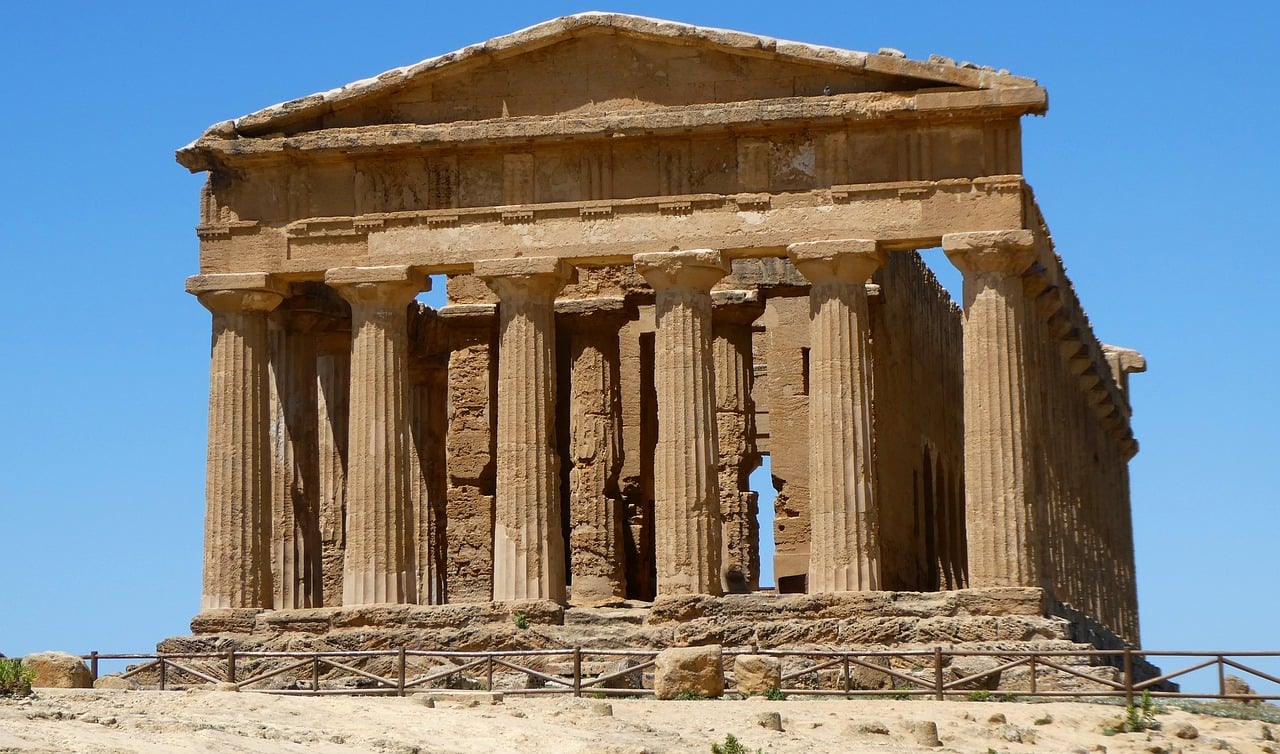
Critique of Progress
Walter Benjamin's critique of progress is a profound reflection on how we perceive history and its unfolding. In a world that often celebrates progress as a linear trajectory towards improvement, Benjamin challenges this notion by suggesting that history is not merely a series of advancements but rather a complex tapestry woven from a multitude of experiences, struggles, and setbacks. He argues that the idea of progress can be misleading, as it tends to overshadow the darker aspects of our collective past, rendering them invisible in the relentless pursuit of a brighter future.
Benjamin's perspective invites us to reconsider the very essence of progress. He posits that what we often regard as progress is, in fact, a selective memory that glorifies certain achievements while conveniently forgetting the injustices and traumas that accompany them. This selective amnesia can lead to a distorted understanding of history, where the voices of the marginalized are silenced and the lessons of the past are ignored.
To illustrate his critique, Benjamin employs the metaphor of the "Angel of History." This metaphor depicts an angel being blown backward into the future, while facing the wreckage of the past. This imagery vividly captures the tension between progress and the weight of history. The angel's struggle symbolizes the collective memory of humanity, burdened by the traumas and injustices that are often brushed aside in the name of progress. It raises a poignant question: at what cost do we pursue this notion of progress?
In Benjamin's view, the linear model of history fails to account for the cyclical nature of human experience. He suggests that moments of crisis and upheaval can serve as opportunities for reflection and transformation. Rather than viewing history as a straight line moving ever upward, he encourages us to see it as a series of interconnected moments, where the past continuously informs the present and future. This understanding opens the door to revolutionary potential, allowing us to reclaim the narratives that have been marginalized and to challenge the dominant paradigms that shape our understanding of history.
Ultimately, Benjamin's critique of progress serves as a call to action. It urges us to engage with our past, to confront the uncomfortable truths that lie within it, and to recognize that true progress cannot be achieved at the expense of collective memory. By embracing a more nuanced understanding of history, we can begin to envision a future that is not only informed by the lessons of the past but is also inclusive of the diverse experiences that shape our shared humanity.
- What is Walter Benjamin's main argument about progress?
Benjamin argues that progress is often a misleading concept that overlooks the darker aspects of history, suggesting that we should view history as a complex interplay of moments rather than a linear trajectory. - How does the metaphor of the Angel of History illustrate Benjamin's critique?
The Angel of History represents the struggle between progress and the weight of past traumas, highlighting how history's wreckage is often ignored in the pursuit of a better future. - What does Benjamin mean by the cyclical nature of history?
He suggests that history is not a straight line but a series of interconnected moments where the past continually influences the present and future. - Why is collective memory important in Benjamin's philosophy?
Collective memory helps us confront past injustices and informs our understanding of history, which is essential for achieving meaningful progress.

Messianic Time and Redemption
Walter Benjamin's concept of messianic time represents a profound departure from conventional historical narratives. In his view, history is not merely a linear progression from past to future, but instead, it is filled with moments ripe for redemption and transformation. This idea invites us to reconsider the way we perceive historical events and their implications for our present and future. Benjamin suggests that within the fabric of history, there exist opportunities that can be seized to challenge the status quo and enact meaningful change.
At the heart of messianic time is the belief that every moment holds the potential for revolution. Benjamin's philosophy implores us to recognize these fleeting instances where the past can inform and re-shape our current realities. He posits that during times of crisis, when the conventional order is disrupted, we are presented with a unique chance to reflect on our history and to act upon it. This is where the idea of redemption becomes crucial. It is not about waiting for a messiah to arrive but recognizing that we ourselves can be agents of change.
To illustrate this concept, Benjamin employs the metaphor of a storm. He describes history as a storm that can either sweep us away or be harnessed to propel us forward. In this sense, the revolutionary potential within messianic time is akin to a lightning strike: it is sudden, illuminating, and offers a brief glimpse into the possibilities that lie ahead. However, just like a storm, it requires us to be prepared to act swiftly and decisively.
Benjamin’s critique of deterministic historical narratives is particularly relevant in today’s context. He challenges us to rethink our relationship with history, urging us to embrace the ambiguities and complexities that define our past. By doing so, we can cultivate a deeper understanding of our present and the choices we make for the future. This perspective not only empowers individuals but also encourages collective action, as we recognize that our histories are interconnected.
In conclusion, the notion of messianic time and redemption in Benjamin's philosophy is a call to action. It reminds us that history is not just a series of events but a dynamic interplay of moments that can lead to transformative outcomes. By acknowledging the potential for redemption in our historical narratives, we can actively participate in shaping a future that reflects our shared values and aspirations.
- What is messianic time in Walter Benjamin's philosophy?
Messianic time refers to the potential moments in history that allow for redemption and transformative change, challenging the linear perception of historical progression.
- How does Benjamin's concept of redemption relate to contemporary issues?
Benjamin's idea of redemption encourages us to seize moments of crisis to enact meaningful change, making it relevant to various social and political movements today.
- Why is the notion of revolutionary potential important in Benjamin's thought?
The revolutionary potential emphasizes the importance of recognizing and acting upon opportunities within history to challenge existing power structures and promote social justice.

Revolutionary Potential
Walter Benjamin's philosophy is a treasure trove of ideas that ignite the imagination, particularly when it comes to the concept of . At its core, this idea suggests that within moments of crisis, there lies an opportunity for profound change. Benjamin believed that history is not merely a linear path leading to an inevitable future; instead, it is a complex tapestry woven from myriad experiences and events. Each thread represents a moment where the past and present collide, creating a space ripe for transformation.
Consider this: every time we face a societal upheaval, whether it be political unrest, economic downturns, or cultural shifts, we are presented with a crossroads. At these junctures, we can either succumb to despair or embrace the possibility of change. Benjamin's philosophy encourages us to seize these moments, to recognize that they are not just challenges but also opportunities for revolutionary action. It's as if he is urging us to take a step back and view history through a different lens—one that highlights the potential for radical reimagining of our circumstances.
Moreover, Benjamin's emphasis on the messianic time reinforces this idea of revolutionary potential. He suggests that history is punctuated by moments that are charged with the possibility of redemption. These moments are not just fleeting; they are invitations to rethink our relationship with the past. In his view, the act of remembering is not passive; it is an active engagement that can lead to transformative outcomes. By revisiting and reinterpreting historical narratives, we can unearth hidden truths and catalyze change.
To illustrate this further, let’s consider a few key aspects of Benjamin's revolutionary potential:
- Historical Awareness: Understanding our history allows us to identify patterns, learn from past mistakes, and recognize the moments that demand action.
- Collective Memory: Shared experiences and memories can galvanize communities, fostering solidarity and a collective desire for change.
- Critical Reflection: By critically reflecting on historical events, we can challenge dominant narratives and create space for alternative perspectives.
In essence, Benjamin's revolutionary potential is a call to action. It implores us to look at our historical context not just as a backdrop but as a dynamic force that can shape our future. By embracing the chaos and complexity of history, we can find the courage to act, to innovate, and to imagine a better world. The past is not a weight that drags us down; it is a foundation upon which we can build a more equitable and just society.
- What is revolutionary potential in Benjamin's philosophy? Revolutionary potential refers to the opportunities for significant change that arise during moments of crisis, encouraging active engagement with history.
- How does Benjamin view history? Benjamin sees history as a complex interplay of moments rather than a linear progression, emphasizing the importance of remembering and reinterpreting the past.
- What role does memory play in revolutionary potential? Memory plays a crucial role as it helps individuals and communities recognize patterns, learn from the past, and mobilize for change.

Influence on Contemporary Thought
Walter Benjamin's philosophy has left an indelible mark on contemporary thought, resonating across various disciplines such as cultural studies, critical theory, and philosophy. His ideas challenge traditional narratives and encourage a reevaluation of how we perceive history and its implications for the present. One of the most significant aspects of Benjamin's influence is his critique of linear progress, which has inspired a multitude of thinkers to reconsider the way we understand historical development. Instead of viewing history as a straightforward path towards improvement, Benjamin invites us to see it as a complex tapestry woven from diverse threads of experience, memory, and trauma.
In cultural studies, Benjamin's emphasis on the relationship between memory and historical narratives has sparked discussions about how personal and collective memories shape our identities. This interplay is crucial in understanding how societies construct their narratives and how these narratives can be both liberating and oppressive. For instance, the way a community remembers its past can influence its current social dynamics, often leading to a reexamination of historical events that have been overlooked or misrepresented.
Moreover, Benjamin's notion of now-time has been particularly influential among contemporary theorists. This concept encourages a focus on the present as a moment of potentiality, where past injustices can be acknowledged and addressed. By highlighting the significance of the present, Benjamin's philosophy urges us to seize opportunities for change, especially during moments of crisis. This idea has been embraced by various social movements that seek to challenge the status quo and advocate for justice, equality, and transformation.
Benjamin's metaphor of the Angel of History also continues to resonate. It serves as a poignant reminder of the dangers of progress that ignores the struggles and traumas of the past. Contemporary thinkers often invoke this metaphor to critique modernity's relentless pursuit of advancement at the expense of historical awareness. This reflection is crucial in fields like postcolonial studies, where the legacies of colonialism and oppression demand recognition and redress.
To illustrate the breadth of Benjamin's influence, consider the following table that outlines key areas of impact:
| Field | Key Concepts | Influential Thinkers |
|---|---|---|
| Cultural Studies | Memory, Identity, Narratives | Stuart Hall, Michel Foucault |
| Critical Theory | Critique of Progress, Now-Time | Theodor Adorno, Jürgen Habermas |
| Philosophy | Messianic Time, Redemption | Slavoj Žižek, Giorgio Agamben |
In summary, Walter Benjamin's philosophy continues to inspire and challenge contemporary thought, providing a rich framework for understanding the complexities of history and its impact on our lives today. His ideas encourage us to engage with our pasts critically, acknowledging the traumas and triumphs that shape our present realities. As we navigate the intricacies of modern life, Benjamin's insights remind us of the importance of memory, the potential of the present, and the ongoing struggle for justice and redemption.
- What is Walter Benjamin's view on history?
Walter Benjamin views history as a complex interplay of moments rather than a linear progression. He emphasizes the importance of memory and trauma in shaping our understanding of the past and its influence on the present. - How does Benjamin's concept of now-time relate to contemporary social movements?
Now-time highlights the significance of the present as a moment of potentiality where past injustices can be acknowledged and addressed, making it a vital concept for social movements seeking change. - What role does memory play in Benjamin's philosophy?
Memory is central to Benjamin's thought, influencing how individuals and societies construct their narratives and understand their identities. It shapes our relationship with history and informs our actions in the present.
Frequently Asked Questions
- What is Walter Benjamin's philosophy of history?
Walter Benjamin's philosophy of history revolves around the idea that history is not a linear progression but a complex interplay of moments shaped by material conditions and collective memory. He emphasizes the importance of re-evaluating historical narratives to uncover revolutionary potential in the present.
- What does Benjamin mean by 'now-time' (Jetztzeit)?
'Now-time' is a crucial concept in Benjamin's thought, representing a moment where the past and present intersect. This convergence allows for a re-examination of history, highlighting moments of crisis that can lead to transformative change.
- How does the metaphor of the Angel of History relate to Benjamin's ideas?
The Angel of History, in Benjamin's metaphor, symbolizes the struggle against the forces of progress that often overlook the past. It illustrates how historical events are frequently dismissed in the relentless pursuit of the future, urging us to reflect on what has been lost.
- What role does trauma play in Benjamin's philosophy?
Benjamin posits that collective trauma is essential in shaping historical consciousness. It allows individuals and societies to confront their pasts, influencing how they navigate their present and future. This perspective urges a deeper understanding of our shared histories.
- How does Benjamin critique the notion of progress?
Benjamin challenges the traditional linear view of progress, arguing that history is not a straightforward trajectory. Instead, he suggests that it is a complex tapestry of moments that can be interpreted in various ways, allowing for new insights and understandings.
- What is messianic time in Benjamin's philosophy?
Messianic time refers to the idea that history is filled with opportunities for redemption and transformation. Benjamin suggests that these moments can challenge deterministic views of historical development and encourage active engagement with the present.
- How does Benjamin's philosophy influence contemporary thought?
Walter Benjamin's ideas continue to shape contemporary discourse in fields like cultural studies and critical theory. His work encourages new interpretations of history, challenging prevailing narratives and inspiring fresh perspectives on our understanding of the past and its impact on the present.



